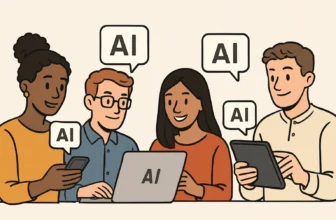
Is AI Friend or Foe to Your Privacy?
Would you believe me if I told you some AI systems know more about you than your best friend… maybe even more than your *mom*?
I know, that sounds dramatic — but it’s kinda true. From the photos you “accidentally” liked at 2 a.m. to the stuff you Google when you can’t sleep, AI is quietly soaking it all in. It’s powerful. It’s impressive. And for anyone even slightly privacy-conscious? Yeah, it’s more than a little spooky.
I remember the first time I noticed it personally. I was talking about a new sleep tracker with a friend (literally, just talking — not Googling, not shopping), and the next day? Ads. Everywhere. I felt exposed. You ever get that unusually specific ad and think, “Wait… how does it KNOW?” That’s AI for you — quietly tracking, learning, adapting.
So… what exactly is the problem?
The problem isn’t that AI is inherently evil (we’re not in a sci-fi movie — not yet, anyway). It’s how it gathers, processes, and holds onto mountains of personal data without us fully realizing what we’re giving up. Every click, scroll, emoji, or voice command could be stored, analyzed, and—*brace yourself*—possibly shared.
And while AI helps in countless ways — personalized playlists, smarter healthcare, faster customer support — it also means our digital footprints are bigger than ever. The trade-off between convenience and privacy? Let’s just say it’s getting murkier by the day.
So what do we do about it? Glad you asked.
- Check your app permissions regularly. It takes five minutes, tops. Look at what access your apps have — do they really need your mic 24/7?
- Use privacy-first tools. Think DuckDuckGo instead of Google, or Signal instead of default messaging apps. These tools are built with privacy in mind.
- Stay informed. Read up on terms of service (I know, I know — snooze fest), or better yet, follow a few trusted privacy watchdog sites. Knowledge is power, my friend.
One surprising stat to chew on? A recent survey found that over 60% of consumers don’t know what data their AI-powered devices are collecting — or why. That’s a huge gap between tech and trust.
Here’s the good news:
You don’t have to cut yourself off from modern life and go live in a cabin with no Wi-Fi (unless that’s your vibe — in which case, go off ✨). The key is to balance the amazing things AI can do with the rights you deserve to keep intact.
Stick with me as we unravel AI’s impact, from digital assistants that faithfully take notes to algorithms silently shaping how you see the world. It’s a wild ride — but together, we’ll figure out how to keep your privacy seatbelt buckled tight.
The Privacy Problem: How AI Collects Data
Ever feel like your phone knows you a little *too* well? Like when you talk about buying new hiking boots and suddenly every ad on your feed is REI this, Patagonia that? You’re not imagining it. Here’s a wild stat to chew on: By the time you finish reading this sentence, AI systems will have processed more than 400,000 data points just from user interactions around the web. Yep. That’s the digital world we’re living in.
So, where’s all this data coming from?
AI isn’t some creepy robot peeking through your curtains (thank goodness). But it’s sort of like a hyper-curious detective—constantly picking up clues from the things you do online. It collects data from:
- Your browser history (yes, even those late-night deep dives on conspiracy theories…)
- Social media posts, comments, and likes
- Voice assistants like Alexa or Siri
- Location data through apps and GPS
All of this becomes fuel for AI to build an eerily accurate profile of you. It learns your patterns—when you shop, what you read, who you follow. Pretty impressive… and kinda terrifying, right?
The Method Behind the Magic (Or Madness)
Once AI has this data, it doesn’t just sit there collecting dust. Nope—it dives in with powerful pattern-recognition algorithms. This is how platforms suggest your next binge-watch or figure out which headlines will make you click.
But it’s not all fun and TikTok recommendations. Take facial recognition, for example. A lot of those systems are trained on publicly available photos—often scraped without asking permission. Add in location metadata from your photos or posts, and suddenly an AI knows where you were and who you were with. Spooky, huh?
I once uploaded a selfie from a coffee shop on a lazy Sunday. A few days later, I started getting ads for diet plans, with AI assuming I had overindulged in pastries. Not only invasive, but a tad judgy too?
Okay, What Can We *Actually* Do About It?
Good news: You don’t have to go full digital hermit. There are ways to push back and protect your personal bubble. Here are three practical steps I swear by:
- Audit your apps regularly: Go through your phone and prune those unnecessary apps—especially the ones asking for weird permissions (why does that flashlight app need your location?!).
- Use privacy-friendly tools: Switch to search engines like DuckDuckGo, browsers like Brave, and messaging apps like Signal to limit data trails.
- Dive into your settings: Seriously, take a scroll through your phone and social media settings. Turn off location tracking, limit ad personalization, and clear history often.
It’s About Balance, Not Fear
Look—we don’t have to swear off technology and move to a cabin in the woods. AI can *do* some amazing things. The key is being aware, staying informed, and taking small, consistent steps to guard our digital selves.
Your data is your story—own it, protect it, and be the main character who knows what’s up.
The Fine Line: When AI Crosses Privacy Boundaries
Did you know that some smart home devices have been caught recording conversations even when they weren’t “technically” activated? Yeah, creepy doesn’t even begin to cover it. It’s like inviting a robot roommate into your home and then realizing it doesn’t always respect your closed-door moments. Yikes.
I remember chatting with a friend about a surprise birthday plan—right in her living room, nothing major. Two days later? Her Facebook ads were all about birthday party supplies and “secret planning.” Coincidence? Maybe. But it certainly *felt* like someone—or something—was eavesdropping.
Let’s be real: AI is amazing. It helps us get personalized recommendations, navigate routes, even remind us of our meeting with “Samantha at 3 PM” (thanks, virtual assistant!). But the second it starts crossing the line from helpful to invasive, we have a problem.
So… Where’s the Line?
AI’s biggest strength—its awareness—can also be its biggest weakness if not handled properly. It reads patterns, anticipates our needs, and yes, sometimes collects our personal data without us knowing. This includes:
- Smart TVs listening for voice commands… and possibly more
- Fitness trackers collecting incredibly personal health info
- Home security cameras uploading footage to cloud servers we don’t fully control
These systems rely on data to function. That’s not inherently bad—but when companies stretch the definition of “user consent,” it starts to feel less like convenience and more like surveillance.
What Can We Actually *Do*?
Okay, time for the good news: You’re not powerless here. There are real, manageable steps you can take to protect your space, both digitally and literally.
- Check device permissions: Go into your smart home apps and review what data they have access to. You’d be shocked how many default to “all access, all the time.”
- Use mute buttons (and actually press them!): Most smart speakers have a physical mute switch—use it when privacy matters. And no, you’re not being paranoid, you’re being smart.
- Know your rights: Depending on where you live, you may have solid privacy laws in place (like GDPR in the EU or CCPA in California). Get familiar with them so you know when a company crosses the line—and how to push back.
One stat that always floors me: Over 60% of consumers don’t fully understand how their data is collected or used by AI-powered devices. No wonder privacy violations go unnoticed! The more you learn, the more power you have to say “no thanks” or at least “okay, but only on my terms.”
You Deserve to Feel Safe in Your Own Home
Look, AI’s not going anywhere—it’s only going to get smarter, faster, and more integrated into our lives. But that doesn’t mean we need to trade our privacy for convenience. It’s all about balance, and you get to choose where the line is drawn in your digital life.
So go ahead, enjoy your voice assistant and your smart thermostat. Just do it on your terms, with your eyes wide open. You’ve got way more control here than you might think—and that’s a pretty empowering place to be.
Protecting Privacy: Legislative and Personal Actions
Did you know that over 60% of the world’s population lives in countries without comprehensive privacy laws? Yep, that’s more than 4.5 billion people whose digital lives could be up for grabs. Spooky, right?
Now, imagine scrolling through your favorite social app, binge-watching videos, or ordering a cheeky late-night snack—and all the while, some company is quietly collecting, storing, and possibly selling your data. Kinda makes you want to throw your phone out the window, huh?
So, what’s the real problem here?
Here’s the thing: Privacy laws are all over the place—literally. Some countries, like Germany or Canada, are leading the charge with strong data protection rules. Others? Well… not so much. It’s like a patchwork quilt sewn by someone who ran out of thread halfway through.
This inconsistency means that your digital rights can drastically change just by crossing a border—or even clicking a link that takes you to a different server. It’s frustrating, confusing, and let’s be honest, kind of unfair. Especially when you’re doing your best to protect your own data, only to find the law’s ten steps behind.
Good news though: Things are changing.
Governments are finally waking up. Europe’s GDPR has been a game-changer, holding companies accountable for how they handle data. Brazil, India, and even California are all rolling out new rules to put privacy back in the hands of consumers—where it belongs.
But here’s the kicker: Legislation doesn’t move fast. And it won’t protect you overnight. That’s where we come in. You and me. We can make privacy personal. Let me tell you about my friend Jamie.
A true story for inspiration
A few years ago, Jamie discovered that a fitness app she loved was sharing her location data with advertisers. Yeah, not cool. But instead of deleting the app and moving on, she did some digging. She found out that under local laws, she could request all the data the app had on her—and get it deleted. She sent the request, filed a complaint with the country’s Data Protection Authority, and you know what? They responded. The app got a slap on the wrist, and even better, they rolled out a new privacy update shortly after. One person, big impact.
Want to take action too? Here’s how:
- Get curious about your country’s privacy laws. Google “[your country] + data protection law” and skim the basics. You’ll be surprised what you’re entitled to.
- Use your legal rights. Many regions allow you to request your personal data from companies and demand changes or deletion. Flex that privacy muscle!
- Speak up. Join local privacy advocacy groups (many are online), sign petitions, or even talk to your local representative. Lawmakers need to know people care about this stuff.
It might seem like a massive battle between little ol’ us and the tech giants—but every time someone demands transparency or makes noise about data abuse, they chip away at the power imbalance. And honestly, that’s how change begins: one informed decision, one empowered person at a time.
So let’s keep pushing. Stay informed. Stay loud. And let’s make digital privacy not just a dream, but a right—for everyone.
AI and the Future: Building Privacy-Respecting Technologies
Did you know that 79% of people feel like they’ve lost control over their personal data online? Yep, it’s not just you. Whether it’s voice assistants listening a little too well, or social media platforms that seem to know your every move, this uneasy feeling is more common than we admit.
I remember venting to a friend after I noticed my phone showing me ads for something I’d only *talked about*. That moment of “Wait… who’s listening?” was both creepy and eye-opening. And that’s the problem, right? As amazing as AI is—powering everything from your morning playlist to self-driving cars—it often comes at the cost of privacy.
But here’s the hopeful part: it doesn’t *have* to be that way.
The Challenge: Smarter Tech, Not Snoopier Tech
Creating AI that’s both intelligent and privacy-respecting is a big ask. Most AI systems thrive on data—lots of it. Your likes, locations, voice inputs, shopping habits… It’s like feeding a digital beast. But when that data collection crosses the line, it chips away at your right to privacy.
And let’s be real—most of us didn’t sign up to become data piñatas.
The Future Looks (Data) Bright
The good news? A wave of privacy-first thinking is beginning to shape the future of AI development. Here’s what’s cooking:
- Federated Learning: Instead of sending your data to the cloud, AI models can train right on your device. Think smarter tech with your secrets staying yours.
- Differential Privacy: It adds “noise” to your data before it’s analyzed, so your personal identity is blurred, even to the AI.
- Encrypted AI Processing: Some startups are now building systems where data stays encrypted—even while being processed!
One standout example? Apple’s on-device intelligence. Instead of processing your Siri requests in the cloud, newer models handle it on your phone so your voice never leaves your pocket. Another? Signal, the messaging app built from the ground up to protect what you say—no creepy data mining here.
What You Can Do: Your Role in This Data Drama
You don’t need to be a coder to support privacy-friendly AI. Here’s how we, everyday users and concerned advocates, can make a difference:
- Choose tools that value privacy. Use privacy-respecting apps like Signal or DuckDuckGo. Your downloads send a message.
- Support companies and startups working on privacy-first tech. Many are crowdfunded or depend on community voices.
- Stay informed and speak up. If an app over-collects data, let them know or share your thoughts publicly. These conversations matter more than you think.
We’re standing at the crossroads between innovation and individual rights. Yes, AI is thrilling, but it’s even more powerful when aligned with human values like privacy, autonomy, and respect. And guess what? With conscious choices and growing awareness, we’re not just passive players—we’re part of the movement.
The future of AI doesn’t have to be creepy—it can be conscious. And we’re all invited to help build it.
Empower Your Privacy in an AI World
Did you know that over 70% of people feel they’ve lost control over how their personal data is used online? Yep. That number stings a little, doesn’t it?
And honestly, I get it. AI is everywhere now – from the search suggestions we barely notice, to apps that seem to know what we want before we do. It feels like we’ve traded a bit of our digital soul for convenience. Been there. I once downloaded a cute face-aging app (you know the one), and only later realized it had quietly scooped up my entire camera roll and more. Whoops.
But here’s the thing: we don’t have to sit back and let privacy erosion become the price of progress. We can appreciate the amazing stuff AI brings to our lives *and* still protect what matters. It’s not an either-or situation. It’s about balance, baby.
So what can you actually *do*? Let’s get into it:
- 1. Stay woke on your data. Before you hit “accept all,” pause. Read those privacy settings (yes, even the ones hidden in the depths of your account). Set time in your calendar—just 15 minutes—to audit your app permissions each month. You’d be shocked how much stuff you’ve allowed without realizing.
- 2. Use AI responsibly, not fearfully. Try tools that prioritize privacy, like search engines that don’t track you (hey there, DuckDuckGo) or messaging apps with solid encryption (shoutout to Signal). Supporting these kinds of tech sends a message: we want innovation, but not at the expense of our rights.
- 3. Get loud (in the best way). Advocate for fair AI policies. Whether it’s signing petitions, attending local meetups, or even just sharing awareness posts—your voice counts. One conversation can influence ten others. That ripple effect? Powerful.
I’ve found that just knowing what’s going on behind the scenes gives me so much more peace of mind. It reminds me that I’m not a helpless data point floating around the internet—I’m an active participant. A decision-maker.
Look, we’re standing at a crossroads: one path leads to endless potential—cures, climate solutions, smarter cities. The other? A world where our faces, thoughts, and digital footprints are owned by people we’ve never met. But here’s the good news: we get to decide which road we walk down.
The future doesn’t have to be scary. With a little awareness and a whole lot of heart, we can shape AI into a tool that works for us—not on us. So, let’s grab the reins, take charge of our digital destinies, and keep dreaming big… without giving up what makes us human.
You’ve got this. We all do. Let’s build a smarter—and more private—world together. 🤝












